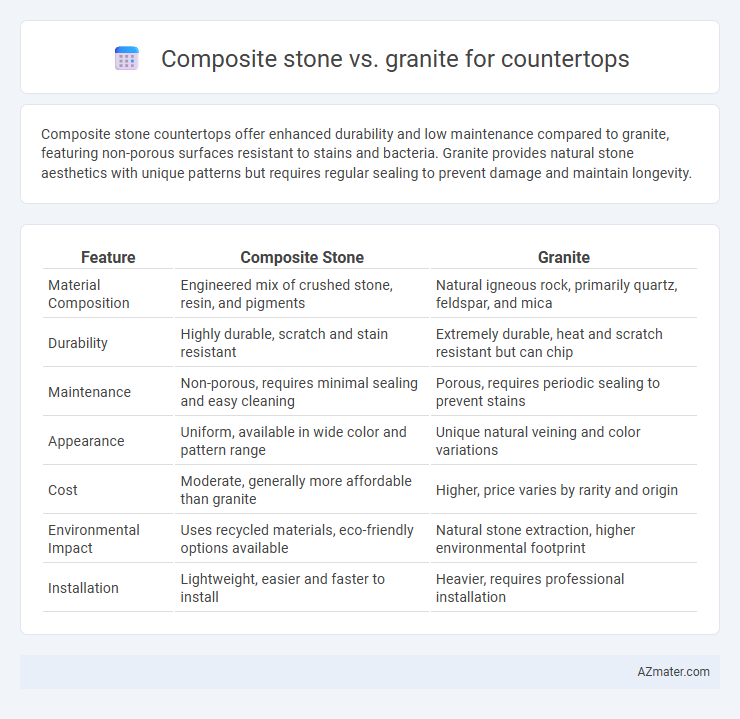Composite stone countertops offer enhanced durability and low maintenance compared to granite, featuring non-porous surfaces resistant to stains and bacteria. Granite provides natural stone aesthetics with unique patterns but requires regular sealing to prevent damage and maintain longevity.
Table of Comparison
| Feature | Composite Stone | Granite |
|---|---|---|
| Material Composition | Engineered mix of crushed stone, resin, and pigments | Natural igneous rock, primarily quartz, feldspar, and mica |
| Durability | Highly durable, scratch and stain resistant | Extremely durable, heat and scratch resistant but can chip |
| Maintenance | Non-porous, requires minimal sealing and easy cleaning | Porous, requires periodic sealing to prevent stains |
| Appearance | Uniform, available in wide color and pattern range | Unique natural veining and color variations |
| Cost | Moderate, generally more affordable than granite | Higher, price varies by rarity and origin |
| Environmental Impact | Uses recycled materials, eco-friendly options available | Natural stone extraction, higher environmental footprint |
| Installation | Lightweight, easier and faster to install | Heavier, requires professional installation |
Introduction: Composite Stone vs Granite Countertops
Composite stone countertops offer a non-porous surface composed of crushed stone and resin, providing enhanced stain resistance and uniform patterns ideal for modern kitchens. Granite countertops, a natural igneous rock, boast unique veining and exceptional durability but require periodic sealing to maintain resistance against moisture and staining. Both materials deliver aesthetic appeal and functionality, with composite stone favored for low maintenance and granite prized for its natural beauty and heat resistance.
Composition and Material Differences
Composite stone countertops are engineered from a blend of crushed natural stone, resin, and pigments, offering uniformity in color and texture, while granite is a natural igneous rock composed mainly of quartz, feldspar, and mica, characterized by unique, varied patterns. Composite stone provides enhanced durability, resistance to stains, and lower porosity compared to granite, which requires periodic sealing due to its porous nature. The synthetic resin in composite stone allows for greater design flexibility, whereas granite's natural formation results in distinctive, one-of-a-kind slabs with natural mineral variations.
Appearance and Design Options
Composite stone countertops offer a consistent and customizable appearance with a wide range of colors and patterns, allowing homeowners to achieve a sleek, modern look. Granite countertops display unique, natural veining and color variations, providing a one-of-a-kind, organic aesthetic that enhances traditional and rustic designs. Both materials cater to diverse design preferences, but composite stone excels in uniformity while granite boasts authentic natural beauty.
Durability and Strength Comparison
Composite stone countertops, made from engineered materials like quartz, offer exceptional durability and resistance to scratches, stains, and heat, making them ideal for high-traffic kitchen areas. Granite, a natural stone, provides strong resistance to heat and scratches but can be prone to chipping and requires periodic sealing to maintain its durability. The engineered composition of composite stone typically results in a more uniform strength and less maintenance, while granite boasts unique natural patterns and solid toughness but demands more care over time.
Maintenance and Cleaning Requirements
Composite stone countertops require less maintenance than granite, as they are non-porous and resist staining without regular sealing. Granite demands periodic sealing to prevent moisture penetration and bacterial growth, which can complicate cleaning. Both surfaces benefit from gentle, pH-neutral cleaners, but composite stone's resistance to scratches and stains simplifies upkeep compared to granite's need for more cautious care.
Stain, Heat, and Scratch Resistance
Composite stone countertops offer superior stain resistance due to their non-porous surface, making them less prone to discoloration compared to granite. Granite provides excellent heat resistance, withstanding hot pots and pans without damage, whereas composite stone may suffer surface burns or discoloration from extreme heat. Scratch resistance is higher in granite, which is a naturally hard material, while composite stone, although durable, can be more susceptible to surface scratches with heavy use.
Health and Environmental Considerations
Composite stone countertops often contain resins and binding agents that may emit low levels of volatile organic compounds (VOCs), impacting indoor air quality; granite, being a natural stone, poses minimal chemical emissions but requires sealing to prevent bacterial growth. From an environmental perspective, composite stone manufacturing consumes energy and produces synthetic waste, while granite extraction involves quarrying that disrupts ecosystems and results in significant carbon footprints due to transportation and heavy machinery use. Choosing between the two requires balancing potential chemical exposure risks with the ecological impacts of resource extraction and material processing.
Cost and Installation Factors
Composite stone countertops generally cost less than granite, with prices ranging from $40 to $85 per square foot compared to granite's $50 to $100 per square foot. Composite stone offers easier installation due to its uniformity and lighter weight, reducing labor time and potential substrate reinforcement costs. Granite, being heavier and more brittle, requires skilled installers and additional handling care, which can increase overall installation expenses.
Longevity and Value Over Time
Composite stone countertops offer superior resistance to stains, scratches, and heat, making them highly durable and maintaining their aesthetic appeal over many years with minimal maintenance. Granite countertops, while highly valued for their natural beauty and unique patterns, require periodic sealing to prevent damage and can develop wear signs faster in high-traffic areas. Over time, composite stone tends to retain its value due to consistent performance and lower upkeep costs, whereas granite's value is often tied to its natural uniqueness but may incur additional expenses for maintenance and repairs.
Which Countertop is Best for You?
Composite stone countertops offer superior durability and stain resistance with a wide range of customizable colors and patterns, making them ideal for modern kitchens requiring low maintenance. Granite countertops provide natural beauty, heat resistance, and unique veining that adds value to traditional or luxury kitchen designs, but require periodic sealing to maintain their appearance. Choosing the best countertop depends on your lifestyle, budget, and design preference, with composite stone favored for consistent performance and granite prized for its authentic natural look.

Infographic: Composite stone vs Granite for Countertop
 azmater.com
azmater.com